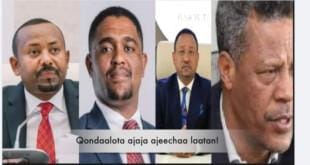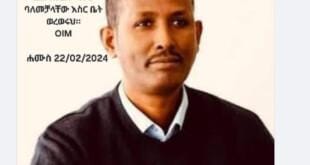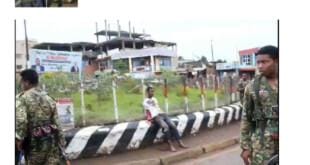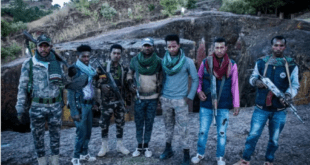by Adnew Wakjira | Ebla 9, 2013
Oromos witness the birth of a new organization, this time midwifed by none other than the OLD Guard of the Oromo movement. (Yours truly, may not be a guard, but is old too). It goes by the name of Oromo Democratic Front, arriving, as it did with less roar than whimper, but certainly causing deep emotions among those of us in the Diaspora.
Let me state the obvious before I proceed any further, that it is within the right of those Oromo veteran leaders to form any party anytime they so desire. These are men of impeccable credentials, as impeccable goes, in the Oromo movement and this ordinary individual would be the last person to cast aspersions on their patriotism. They have given their all… friends, family, property, prestige…for the freedom of their people. They, along others, who have paid dearly, including with their precious lives, to advance the just cause of the freedom of our people, deserve our eternal thanks and gratitude.
Without their self-less sacrifices, we wouldn’t be where we are today. They have helped us achieve agreat deal although a lot more remains to be done. We have yet to see a perfect organization, anywhere, but there is no hiding from the fact that there were always whispers of the ossification of the organization, capriciousness of the leadership, the dearth of accountability, the absence of new and creative ideas; which led to inertia which in turn culminated in the unfortunate state of “paralysis”. As a matter of fact the Organization did effectively split a decade ago into the factions we have come to know thereby having a debilitating impact on its capabilities both at home and abroad.
Be that as it may, the creation of the Oromo Democratic Front is raising as many questions as it tries to answer on different levels of the Oromo question. Most bewildering to most Oromos, is why they chose to break away from the OLF at a time when the two major factions are ironing out their differences in order to close ranks in the interest of a stronger and revitalized organization. It comes at a time when following more than a decade of uncertainty surrounding the organization, prospects for the Oromo movement are finally looking up.
According to the ODF’s manifesto, and all the ensuing media interviews coming from ODF officers, the raison d’etre for the splinter organization is that the Oromo movement has hit an impasse and fresh thinking is required to move it forward. Few would argue with that.
Forty years on, Oromos find themselves as further away from their cherished goal of freedom as when the struggle was launched in earnest. Indeed we are worse off in the single most important aspect of our existence as a nation: our very survival as a people and as a community has come under assault with the mass evictions of our people from their ancestral lands, reminiscent of the Emperor’s last days when farmers from the South were evicted to give way to commercial farms.
The dictatorship in Finfinne may have tolerated the use of our language in Oromo territories but the very land inhabited by Oromos is being taken away and sold to foreign capitalists. Afaan Oromo will soon become the language of the latifundia’s should current trends be allowed to continue. This is the clear and present danger facing Oromos and to a less extent others as well in Ethiopia. The circumstances Oromos find themselves in within Ethiopia today must be some of the most difficult , if indeed not the worst, moment in their history.
Hence the notion proffered by the ODF that the Oromo movement is caught in a logjam is inescapable. The ODF has brought onto the surface a matter of historic proportions that has long been simmering under the surface of the Oromo revolution. We must all have wondered at point or another what the problem really is that has blocked, or severely hindered at best the Oromo quest for freedom; geopolitics, lack of a committed leadership, lack of external support…, or indeed is it the very Kaayyoo of the Oromo movement, as the ODF recently came out claiming. In the final analysis, it could well be any one of the above or a combination of all.
Kayyoo/goal is the operative word here. In an ideal world the very stakeholders of a process of liberation like ours would have their own input into the very formulation of the goal or its renewal thereof, directly or through some sort of delegation. But we know that is impossible in today’s Ethiopia; hence the task, like many others, is normally left to the discretion of the political elite who are spearheading the fight. It’s not uncommon then for individual or groups to harbor different and competing ideologies in order to control the direction of the movement.
The ODF, by giving voice to an issue not many Oromo patriots of Lencho Lata’s standing and caliber have dared to broach, not in public at least, has broken new ground. (We have heard the virtues of Ethiopian unity preached by others before, notably by Kemal Gelchu and his Jijjirama colleagues but that has remained a flash in the pan). The very centrality of the issue, subscribing to liberation that could include establishing an independent Oromo state as the ultimate goal of the Oromo movement, has been a matter unspoken as it is sacrosanct. Questioning the validity of the goal was tantamount to heresy or treason.
The availability of options is not a bad thing in itself. The problem is it carries the danger of fragmentation with all its attendant consequences. Oromia’s estimated population of 40 million shouldn’t have a problem accommodating the handful of parties and fronts operating therein. But the critical issue is the pooling of scanty resources, material as well as human that almost becomes a prerequisite for a successful liberation struggle.
All along the general Oromo public were kept well in the dark regarding the debate…others might call internal strife… going on within the Organization they banked so much on and which they supported, including with their lives. Severe, if not irreparable, damage was inflicted on the Oromo struggle as a result.
While identifying the problem is half the solution, as they say, it is hard, however, to see the ODF realizing its ultimate goal by means of the policies it has chosen to pursue or the tactical options it’s adopting. One such goal will be to turn “subjects” into “citizens”, the very framing of which automatically assumes the existence of a power/ a political system that needs to be removed for it to happen. But it is not clear exactly how that could be brought about when they profess so much equivocation and hesitancy surrounding the issue.
The “subjects” and “citizens” itself is not really such a revolutionary concept as purported by the ODF and there is no magic wand to convert the former into the latter short of an arduous and painful process of liberation that might involve more sacrifice.
In the aftermath of the ODF, the attempt made by the leaders of the organization to carry on dialogue and debate with the Oromo communities in the Diaspora in order to sell the project must have come as a humbling and disconcerting experience. For me it was a source of sadness.
A painstaking effort is exerted by the same officers to draw a contradistinction between the ODF and all the other Oromo parties operating at home, including the OPDO. Unfortunately, this crucial aspect of the campaign has failed thus far to register with the majority of Oromo as evidenced in the public gatherings organized by the leaders of the ODF. It has been a sorrow state of affairs to witness the once respected leaders of the OLF being rebuked by speaker after speaker for effectively abandoning the ideology of the Oromo struggle they had formulated in the first place.
That is why the matter is evoking such deep visceral emotions in our people. The people we have come to see on the stages of the town-hall meetings introduced to Oromos as the leaders of the ODF are the very individuals Oromos have entrusted with their political future and lives. The whole situation comes across as awkward. It was not hard to read a sense of incredulity from the faces of those participants. Not to mention a sense of betrayal and despair.
A good case in point is this poor Oromo woman who took the floor for a question then lost her composure and broke down in tears in the process. Among other things, this lady asked of Lencho Leta why he did not work within the OLF to bring about the changes desired or pay the ultimate sacrifice trying. I had no knowledge of her background but she was obviously someone who lost friends and relatives to TPLF tyranny and had personally gone through a lot of hardship prior to her exile in the US. This lady I thought epitomized the pain and dilemma, not to mention the outrage, felt by Oromos.
Most significant in terms of reception will, needless to say, be the reaction of the people who bear the brunt day in day out of the repression and atrocities of the regime in Ethiopia, Ormos at home. Evidence of support for the ODF among the Oromos Diaspora thus far has not been too encouraging; it would not be likely we would see a better situation at home.
The big player on the home front of course is the Oromo youth organization, Qerroo. Whether the ODF will pass the muster of Qerroo and get its crucial support will very much determine its future success. As a matter of fact, it would be decisive for any organization, aspiring to lead the Oromo struggle to earn the backing of this constituency. I must add here in parenthesis whether the burgeoning role this dynamic sector of our population is bound to play has been given due recognition by the mainstream Oromo movement. The level of sophistication and maturity some of the leaders of Qerrooare already displaying in their pronouncements is truly remarkable. It seems to me their support is there to be earned, not taken for granted.
The manifesto of the ODF as well as the interviews given by its officers, notably the president, Lencho Leta, come across as replete with ambiguities and contradictions. It could be naive, and misleading, though to take them at face value and draw definitive conclusions as to their real intent. Adept politicians that they are, they may be trying to leave themselves enough room for maneuver. This coming from such a veteran group of activists well seasoned in the art of the game shouldn’t come as a great surprise. These are politicians you would least expect to make an elemental oversight of this magnitude.
Behind the ODF’s formation is clearly a reckoning of garnering cooperation by reaching out to all the powers that could have a bearing on the Oromo struggle (the Ethiopian opposition, the outside world…etc) whilst at the same time maintaining their bond with the mainstream Oromo movement. Nothing wrong with that per se except that it had been tried before and did not work. There is no evidence it could meet with a different fate this time round.
The lukewarm reception, publicly at least, the ODF has received from the Ethiopian parties/ media only goes to validate the fact that cooperation is a two-way street. By contrast Jijjirama got almost a gleeful reception. And this to me speaks volumes in itself. It’s an indication a) that leaders of the ODF are so deeply rooted in the Oromo movement that an abrupt flip flop or an appearance thereof would not warrant instant embrace and b) Jijjirama had very little pedigree within the Oromo struggle and was therefore more amenable to manipulation as an ally.
Jijjirama enjoyed a short- lived honeymoon with Ginbot 7; achiin mataan isaayyu jijjiramu chalqabee, the rest as they say is history. I am hoping the ODF is not taking a similar route because its leaders, whom millions of Oromos, including myself, regard with respect, deserve much better.
Mobilizing the support and cooperation of all democratic forces, whether of oppressor or oppressed, is an imperative for lasting stability and peace in the country and in the Horn region at large. But it’s a case of we have been there and done that for Oromos in this context. There was Jijjirama, a phenomenon fresh in our memories from three years ago. And there was the one before that (was it Alliance for Freedom and Democracy?) from a decade or so ago and nearly faded now from an aging memory.
A decade apart, nonetheless those attempts at alliances had the same goal to my knowledge: galvanizing and forging an ambitious alliance of the political elites of the various population groups as a sure way of defeating the regime now in power, well, on paper at least. But an untold narrative of this story is that some of those are historically antagonistic and hence seek to remove the TPLF regime for diametrically opposite goals; the principal reason the present regime has appropriated itself the role of arbiter occupying the middle ground. The outcomes they expect are incompatible and neither party is prepared to make the kind of historic compromise that is required to resolve the Problem created by Ethiopia’s imperial past. Not yet at least. But that Oromos should strive to do their part utilizing all available fora is beyond dispute.
After all is said and done, however, going by the impression one gets from pronouncements coming out of the ODF and particularly the president’s responses during media interviews, one is inclined to take the ODF more as an offshoot of the OLF than a breakaway faction.
There are apparent inconsistencies, if in fact not contradictions, that one can detect surrounding vital aspects of Oromo liberation. Nonetheless, all the inconsistencies seem to me to point to the fact that ODF is not designed after all to represent a clean break from the mother organization. The leaders in their wisdom seem to have left the door ajar for obvious reasons; no one can rule out some sort of cooperation if not unity.
And therein lies the salvation for the ODF. It is not out of the realm of possibility for them to find a more productive and suitable role in the external arena, for instance, the one chink in the armor of the Oromo movement, where they presumably have ample contacts. They could serve as the political wing, the kind of model the South Africans utilized very effectively. The complimentary is not too far to discern; the admonition being therefore to put cooperation before conflict and brotherhood before enmity and join hands once again for what is still a common cause and an unfinished business.
–Adnew Wakjira can be reached at adnew_wakjira@hotmail.com




